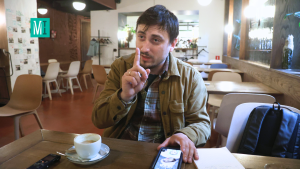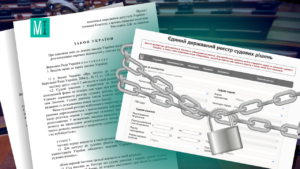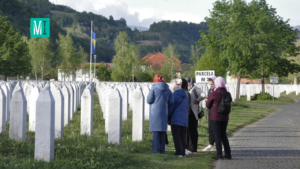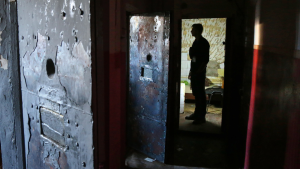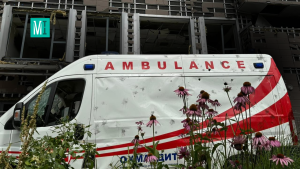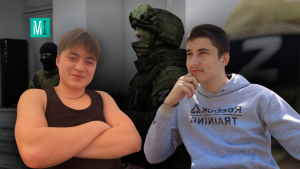Karim Khan: “If we don’t claim to the law, we may have nothing to claim to at all, except empty promises”
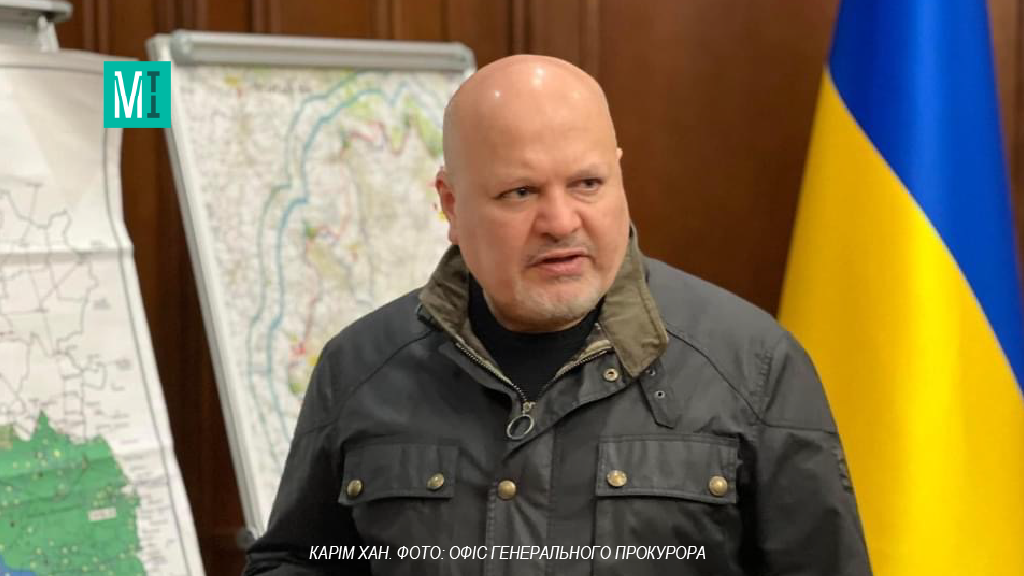
The Prosecutor of the International Criminal Court, Karim Khan, delivered a historic speech on the inevitability of punishment for those who committed international crimes in Ukraine. This happened during the United for Justice: Bucha – The Hague conference, which took place on the anniversary of Bucha’s liberation from the Russian army. MIHR, which was present at the conference, publishes the speech.
“It’s a real privilege to be asked to say a few words at the end of this very important conference in Bucha on the anniversary of a really terrible series of incidents and to continue a really pivotal event that President Zelensky, in fact, opened on the 3rd of March in Lviv. Unprecedented, actually, that in the midst of battle, in the midst of so much danger and heartbreak, there was such focus on the rule of law.
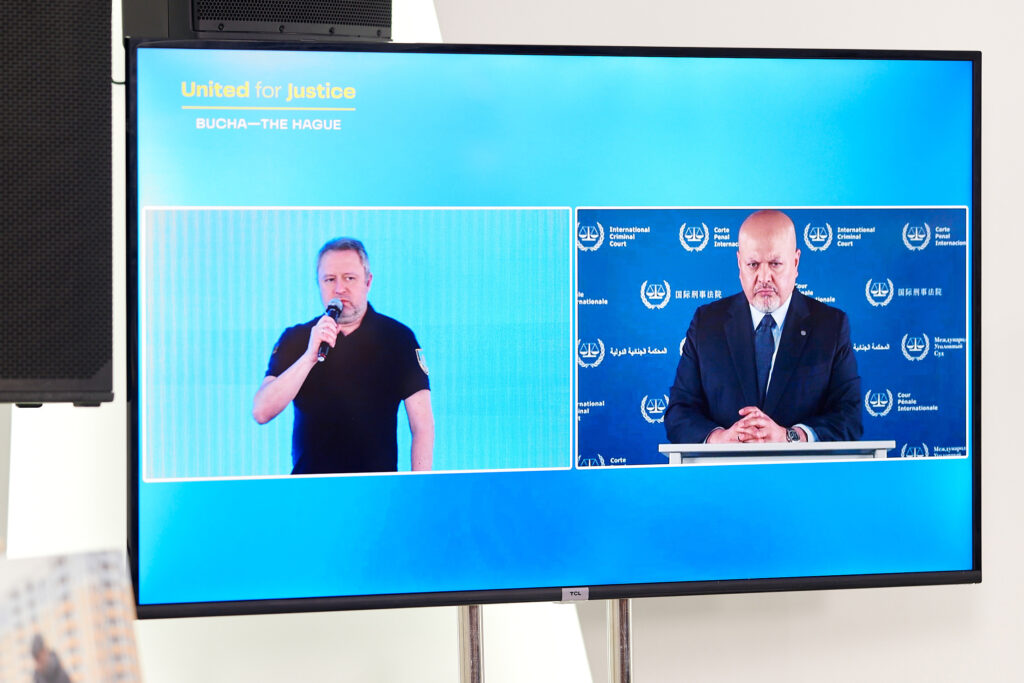
A year ago, we saw really scary pictures on our television screens: bodies, lifeless limbs strewn in streets or outside houses. We started hearing accounts from a town that many of us had never heard of, the town of Bucha. And the accounts we heard were not the first but were another example of information, data, evidence also, that gave us, unfortunately, ever greater confidence that there were reasonable grounds to believe crimes being committed on the sovereign territory of Ukraine. And I think before we go further, it’s only right to applaud the fearless work not only of the Prosecutor General’s Office, and I’ll come back to that at the moment, but also the road work of journalists. Journalists from around the world have been on the front lines. They’ve been documenting crimes. Very often, they’ve been there in extremely perilous situations, but the ability to capture snapshots, to have video evidence so soon after alleged crimes have been committed, I think, is exceptionally important.

We live in a world where there are counter narratives extremely quickly, and this is something we know in history. Churchill, of course, is well-known to say that “A lie gets halfway around the world before the truth gets a chance to get its pants on.” So this is one additional reason why it is so important that there is an independent investigation, why it’s so important there are independent judges that are dedicated to upholding the rule of law and separating truth from fiction.
The fact that justice is an imperative but not an optional expert is one that resonated strongly. The cohesion and unity of purpose, I’m pleased to say, show no sign of diminishing. And just two weeks after the events in Bucha were reported, I myself was on the ground and walked the streets of Bucha. And with those accounts, with the information we had received, resonating in my ears and almost in my mind, I stood just supposed to be the beauty and the dignity of St. Hamburg’s Church and ditches, where dead people had been laid in body bags in fact on the ground in front, the body bags were being closed in front of me… And I spoke to the priest, in fact, that has attended this conference. And I spoke to the expert members of the Prosecutor General’s Office, but also the people that were around. And as I told the Security Council unequivocally a few months later, those bodies were not fake.

And so we have to find a way of establishing the truth and making sure that the promise of ‘never again’ is indicated finally on the territory of Ukraine.
This promise, of course, is the right of humanity. We need to do better everywhere else, but we need to make sure that justice is felt in the real world. So it’s only right to know that the victims, the families that are heartbroken because you’ve lost loved ones, you’ve lost your universe, you’ve lost people that meant the world to you. I offer my most sincere condolences. The people of Ukraine are heartbroken. And the people of humanity, I think a lot of right-thinking people are aghast at the scale of suffering, the unnecessary destruction that we have been witnessing in Bucha and in so many other places here in Ukraine for far too long. It really is abundantly here. That this was a war of choice. It didn’t need to happen. And unfortunately, we have seen such senseless wars in history before. But we have to finally wake up. I think we have to finally realize that we’re on a precipice and be committed to making sure that we don’t see such a senseless war again.
We’ve heard aptitudes many, many times. The people of the world, all parts of the world — the Global North, the Global South, Asia, Latin America, Africa, and Europe, have heard this promise. Unfortunately, as a species, we have short memories, we don’t remember history, and at the United for Peace Conference in Morden, in London, the person that was awarded the 2022 Human Rights Award was from Hiroshima. And he was the Mayor of Hiroshima. And he’s been spending his life working for peace. And when he stood up to accept the award, he held up a photograph of a child that had died when an atomic bomb was dropped on that city. So I think we need to remember that: the consequences of conflict and that things can always get worse, and we need to try to stop things as soon as possible.

So first, to do this, the law needs to be on the front lines. The law needs to be with the people. The law needs to provide some shelter, even as their physical shelter very often is being bombed or is being damaged, or they have to flee it. And this new common front of vitality that I think we are seeing with all the polarisation, and politics in the world that we’re seeing come together because of this perhaps existential moment that is being faced.
It needs to not only march within Ukraine to protect the most vulnerable, but it then needs to march out of Ukraine with an ever greater figure for the people of the world that are feeling under siege, whose rights are being taken, who are being persecuted, who are suffering, who are similarly scared, who are similarly suffering in so many parts of the world. And I think this imperative, this moment of awakening, this moment of realization that if we don’t claim to the law, we may have nothing to claim to at all, except ideology or empty words and empty promises, is one that must make us see sense and realize the importance this moment.
So this new moment of awakening I’ve described, it is not just words because, in an unprecedented manner, within 48 hours of my invitation to states, 39 states referred to Ukraine matter to my office. We now have 43 states in total. And, of course, Ukraine is not being dragged kicking and screaming to the ICC. The only reason we are here is that Ukraine, in 2014 and 2015, accepted as a function of the sovereign will to accept the jurisdiction of the International Criminal Court.
My team has been present on the ground continuously since May. We have been working in imaginative, innovative ways. On many initiatives, including my offer is joining the Joint Investigation Team, new partnerships with Eurojust and the Genocide Network to recognize the critical importance and bravery of civil society organizations. The mobile forensic rotational model that we pioneered together with the Royal Netherlands Marechaussee and within one year of the invasion of Ukraine, the most recent invasion of Ukraine, on the 24th of March, my office, with the excellent work of the men and women of my office, submitted an application for an arrest warrant to the judges of the International Criminal Court.
On the 17th of March, the independent judges of Pre-Trial Chamber II issued two warrants: for president Vladimir Putin and madam Lvova-Belova for war crimes. And for me, and I’ve said it before, this was a sobering moment.
It gave us no pleasure that we were compelled because that teaches the law, because of what we were seeing, because of what we had scrutinized and what we were confident about, that we had to apply for these warrants. And the judges of the ICC felt compelled to issue them that such a nation as the Russian Federation, that the head of government and state official of such a nation, a permanent member of the Security Council, obligated, entrusted by all states of the world to be one of five particular custodians of the UN Charter were found to have a case to answer to the rule of law: to bow not to sovereign will, not to politics or polemics or political interests, but to bow to something greater than all of us, which is our recognition of our humanity, our mortality, and to the rule of law. All individuals, including the two I’ve mentioned, are presumed innocent, that’s a fundamental principle of any competent, mature legal system, and it’s a fundamental pillar of their own statute system that these individuals must submit to justice, they should answer the charges, present any defense they may have, and assert any defense before the ICC.
So I will continue to call upon and request the Russian Federation to present any information that they may think relevant to my office. I do call upon Russian Federation in clear terms for the return of children. I think it’s basic. If there is a centum of truth, if there’s any sincerity that anything done has the very elements of the welfare of children, as a consideration, let these children be returned to Ukraine as soon as possible, directly to Ukraine or through third parties, but let the children go home. The Convention on the Rights of the Child, the Geneva Convention, solely, are the instruments making clear that the welfare of children must be a primary consideration. And I think we must think of these children not only the children of Ukraine but the children of all of us.
And that’s something not particular to Ukraine. We should think of children around the world that are also in power situations as children as if they are our children. Can we sit in peace? Can we sit in comfort? Can we sit as spectators when they are shivering, when they are unsure when they are insecure? Or do we finally have the spine? Do we finally have the dedication to make sure that the law and a convergence of our humanity to make sure the rights of children are vindicated?
So we will continue with as much dedication, with as much integrity, with complete independence as possible but unrelentingly try to get it to the truth, and as required to get it to the truth, we don’t start targets. We focus on the evidence and our obligation to investigate incriminating and exonerating evidence equally. We will continue to work with the excellent cooperation of Prosecutor General Kostin and the Ukrainian authorities and those of many of the states – the JIT: state parties and non-state parties alike.
And the progress that I’ve talked about the innovative models is also demonstrated by the fact that in two-weeks time, 40 experts will deploy, with the assistance of my office, forensic experts will deploy, with the assistance of my office, to Ukraine from the Netherlands, Belgium, and the Czech Republic. Just a week ago, Prosecutor General Kostin and the Registrar of the International Criminal Court signed an agreement establishing a permanent field of office in Ukraine. And again, this is an absolutely necessary step not only in Ukraine but around the world where we are pursuing investigations to make sure we’re with the people; we are with the victims, we are close to the crime scenes, so we can take the law and try to make sure it has an impact upon those that need it most.
We will continue to focus on the full panoply of crimes in our jurisdiction, including sexual and gender-based crimes, of course, deportations (investigations continue), torture, and executions. We have to make sure that there’s no area where people feel they can act with impunity. There’s no area too remote to hit, no place to die where the life of justice will not pierce.
I am delighted today to announce, together with my dear friend and colleague, Prosecutor General Andrii Kostin, another innovation that we are establishing a new task force between my office and the Prosecutor General’s to focus on specific joint priorities, to make sure that the law can be felt as soon as possible by those that need it the most. And this cooperation is really a temporary model, in my view, of dynamic cooperation. We will, of course, apply for future further warrants if and when the evidence warrants it.
I think I should end with perhaps two observations. Or maybe three. The first is to commend Ukraine for focusing on justice even as it’s fighting for its defense and its sovereignty. Link to that is the realization that the law applies on all sides, and must be felt. One must remember that people are really feeling insecure and they’re feeling in pain. And if I may be permitted hearing the accounts of those who lost loved ones, and seeing those bodies, I recall the Muslim crowd: “Inna Lillahi wa inna ilayhi raji’un” (“from God we come, and to Him surely shall we return”). And this is the month of Ramadan for many Muslims around the world, for which we’re fasting. And Surah Al-Ma’idah of the Holy Quran states what I’m convinced to be a truth, a truth that finds form, and actually is clearly in the Holy Book of the Christians and the Jews within the Talmud, that “to kill one innocent person is to kill humanity, to save one innocent person is as if all humanity has been saved.” So collectively, not even myself, my whole office, but all of us should beseech those, plead to every individual in power with authority, with a gun that feels that they are chieftains or they have domination of the individuals, to appeal to their morality, to appeal to their self-interest. But, ultimately, we also need to enforce a backstop which is the law.
I said when I took up office as Prosecutor of the International Criminal Court in June of 2021 that we need to take the law off the bookshelves and make it being felt. And I can only but commit to the people of Bucha, the people of Ukraine, and actually people around the world who have every right, not the favor that’s getting done, but as a fundamental right by Dīn to their humanity, not living in fear of the police, of rape or their children being adapted or their churches or their synagogues or their mosques being destroyed or wanting destruction, targeting hospitals or schools, that we are trying to make the law be felt. We will continue to do so. We will continue to work closely hand in hand with Ukraine and all partners. This common ground of humanity is the ground that is large enough for all of us in the Global South, from the Global North, from the Common Law, from the Civil Law, from people of faith, of people of no faith bound together to insist that our children deserve a better future. And this is the moment for us to finally say enough of this nonsense.
The material is published with the support of the Prague Civil Society Centre.


